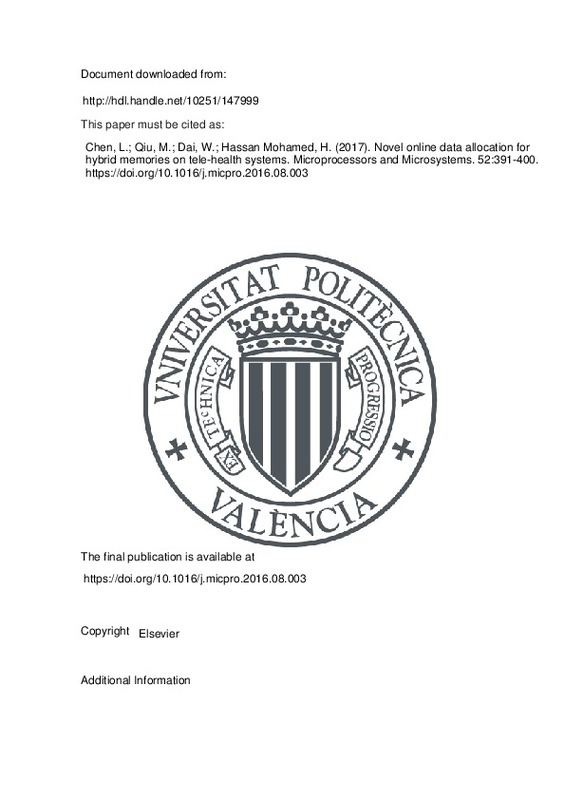JavaScript is disabled for your browser. Some features of this site may not work without it.
Buscar en RiuNet
Listar
Mi cuenta
Estadísticas
Ayuda RiuNet
Admin. UPV
Novel online data allocation for hybrid memories on tele-health systems
Mostrar el registro sencillo del ítem
Ficheros en el ítem
| dc.contributor.author | Chen, Longbin
|
es_ES |
| dc.contributor.author | Qiu, Meikang
|
es_ES |
| dc.contributor.author | Dai, Wenyun
|
es_ES |
| dc.contributor.author | Hassan Mohamed, Houcine
|
es_ES |
| dc.date.accessioned | 2020-07-15T03:32:10Z | |
| dc.date.available | 2020-07-15T03:32:10Z | |
| dc.date.issued | 2017-07 | es_ES |
| dc.identifier.issn | 0141-9331 | es_ES |
| dc.identifier.uri | http://hdl.handle.net/10251/147999 | |
| dc.description.abstract | [EN] The developments of wearable devices such as Body Sensor Networks (BSNs) have greatly improved the capability of tele-health industry. Large amount of data will be collected from every local BSN in real-time. These data is processed by embedded systems including smart phones and tablets. After that, the data will be transferred to distributed storage systems for further processing. Traditional on-chip SRAMs cause critical power leakage issues and occupy relatively large chip areas. Therefore, hybrid memories, which combine volatile memories with non-volatile memories, are widely adopted in reducing the latency and energy cost on multi-core systems. However, most of the current works are about static data allocation for hybrid memories. Those mechanisms cannot achieve better data placement in real-time. Hence, we propose online data allocation for hybrid memories on embedded tele-health systems. In this paper, we present dynamic programming and heuristic approaches. Considering the difference between profiled data access and actual data access, the proposed algorithms use a feedback mechanism to improve the accuracy of data allocation during runtime. Experimental results demonstrate that, compared to greedy approaches, the proposed algorithms achieve 20%-40% performance improvement based on different benchmarks. (C) 2016 Elsevier B.V. All rights reserved. | es_ES |
| dc.description.sponsorship | This work is supported by NSF CNS-1457506 and NSF CNS-1359557. | es_ES |
| dc.language | Inglés | es_ES |
| dc.publisher | Elsevier | es_ES |
| dc.relation.ispartof | Microprocessors and Microsystems | es_ES |
| dc.rights | Reserva de todos los derechos | es_ES |
| dc.subject | Hybrid memory | es_ES |
| dc.subject | Non-volatile memory | es_ES |
| dc.subject | Tele-health | es_ES |
| dc.subject | Data allocation | es_ES |
| dc.subject | Dynamic programming | es_ES |
| dc.subject | Heuristic approach | es_ES |
| dc.subject.classification | ARQUITECTURA Y TECNOLOGIA DE COMPUTADORES | es_ES |
| dc.title | Novel online data allocation for hybrid memories on tele-health systems | es_ES |
| dc.type | Artículo | es_ES |
| dc.identifier.doi | 10.1016/j.micpro.2016.08.003 | es_ES |
| dc.relation.projectID | info:eu-repo/grantAgreement/NSF//1457506/US/EAGER: Towards Low-Latency Low-Power Heterogeneous Memory Access/ | |
| dc.relation.projectID | info:eu-repo/grantAgreement/NSF//1359557/US/EAGER: Towards Low-Latency Low-Power Heterogeneous Memory Access/ | |
| dc.rights.accessRights | Abierto | es_ES |
| dc.contributor.affiliation | Universitat Politècnica de València. Departamento de Informática de Sistemas y Computadores - Departament d'Informàtica de Sistemes i Computadors | es_ES |
| dc.description.bibliographicCitation | Chen, L.; Qiu, M.; Dai, W.; Hassan Mohamed, H. (2017). Novel online data allocation for hybrid memories on tele-health systems. Microprocessors and Microsystems. 52:391-400. https://doi.org/10.1016/j.micpro.2016.08.003 | es_ES |
| dc.description.accrualMethod | S | es_ES |
| dc.relation.publisherversion | https://doi.org/10.1016/j.micpro.2016.08.003 | es_ES |
| dc.description.upvformatpinicio | 391 | es_ES |
| dc.description.upvformatpfin | 400 | es_ES |
| dc.type.version | info:eu-repo/semantics/publishedVersion | es_ES |
| dc.description.volume | 52 | es_ES |
| dc.relation.pasarela | S\353285 | es_ES |
| dc.contributor.funder | National Science Foundation, EEUU | es_ES |







![[Cerrado]](/themes/UPV/images/candado.png)

